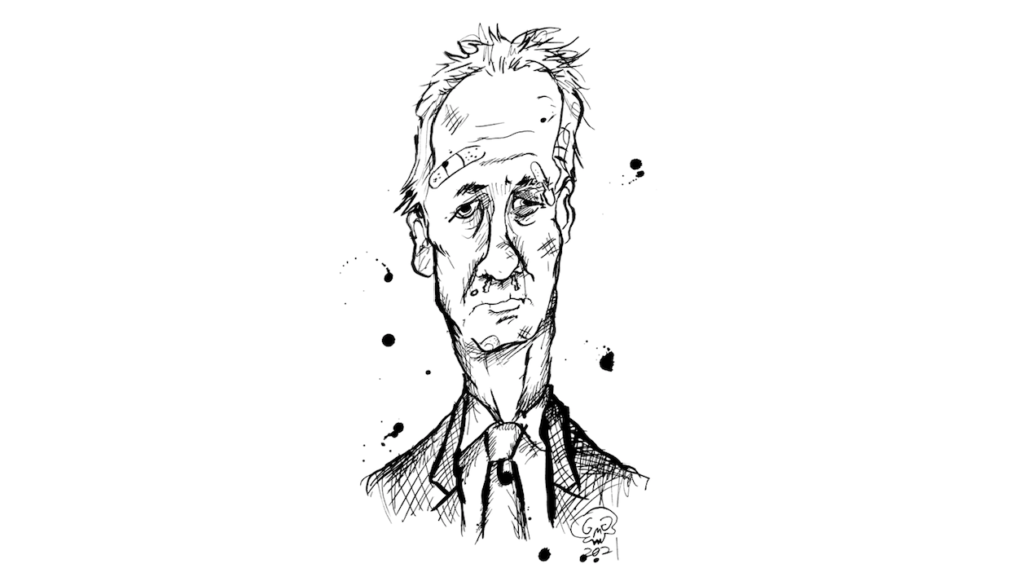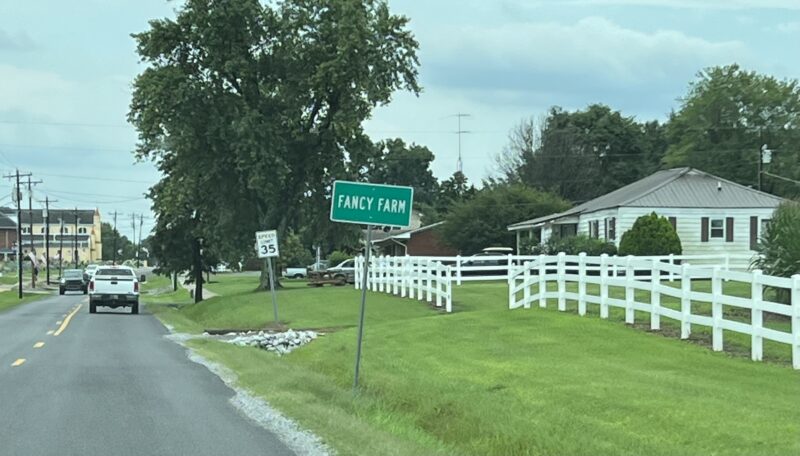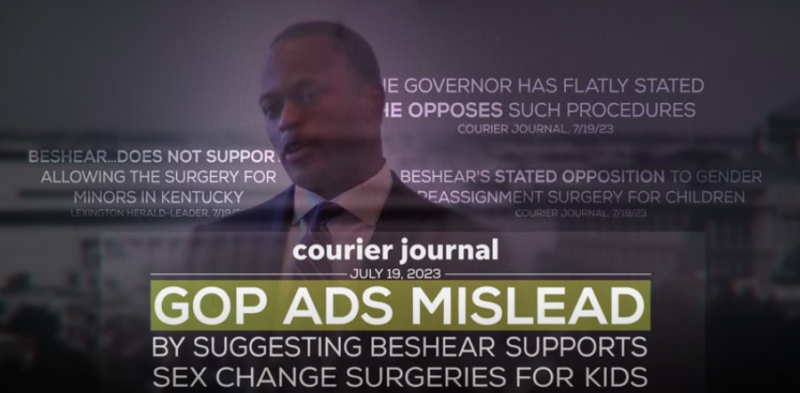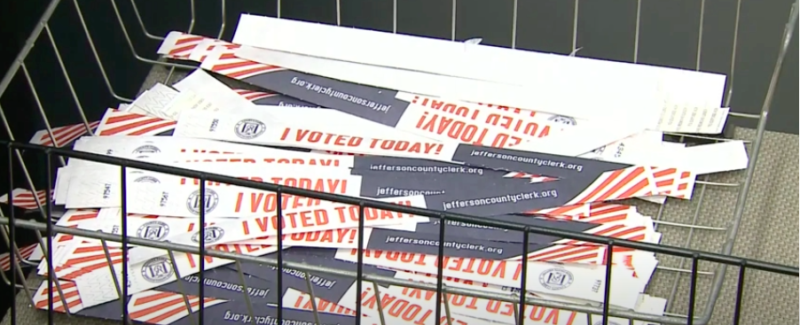It was 2019 and somehow Greg Fischer had his future by the short and curlies, this notion was affirmed by some in the nation’s capital who saw him as a man on the rise, and then everything completely fell apart.
A rising star of the Democratic Party in the bluegrass state, Louisville Mayor Greg Fischer was being romanced by Washington D.C. strategists to run for the United States Senate, again. Now, those close to him say every day is a fight for survival as he limps to the finish line in his third, and final term as mayor.
Before everyone knew the name Breonna Taylor, Fischer’s downfall was already in the making.
Fischer’s wealth is made in ice, not by way of the flashy diamonds some rappers like to show off, but the solid-water kind. In his early 20’s he’s credited with co-inventing the SerVend, an automatic beverage and ice dispenser. The idea came from the hospitality industry, teenagers were getting into the open ice machines at hotels and urinating in the machines. The solution, closing the ice from the customer. The invention is still used in restaurants and convenience stores around the globe today. With his father George’s help he grew the business.
Looking back now 11 years later, Fischer’s legacy is melting as quickly as ice once it leaves a SerVend. To understand Fischer’s downfall, we have to go back to the beginning. Those in Fischer’s orbit who discussed where things went wrong with KFP on a condition of anonymity, say there are three fatal flaws in the businessman that just happens to be mayor, he failed to build relationships, he lacks leadership and thinks he’s the smartest guy in the room.
In 2010, Fischer then 51 years old, a businessman with an ever expanding widow’s peak and droopy eyes came to power after narrowly defeating another wealthy businessman in Republican Hal Heiner. This was not Fischer’s first foray into politics – he lost in the 2008 Democratic primary for the United States Senate seat to challenge incumbent Republican Mitch McConnell. It was in this race that some say really seeded what was to come – the need to never lose another race, to never again feel defeated.
Fischer didn’t lose in 2008 by a little, he took a good old fashioned beating, losing by more than 100,000 votes to the Democratic nominee, Bruce Lunsford.
Two years later, he found redemption but only by a margin. He won with 51 percent of the vote, just a 7,000 vote difference out of 258,000 total votes cast. Some say he should have lost that race – but he got lucky. This 2010 race was a midterm election. Obama’s halfway point of his first term was a turning point for Americans, but Fischer playing up his businessman accolades was able to withstand Hal Heiner’s push to bring out conservatives. Heiner picked up with south end of Louisville, but Fischer brought more votes in the east end suburbs. Using his business backing Fischer appealed to Republicans, but it was the Louisville Democratic elite who was backing him behind the scenes.
Smartest in the Room?
Former Mayor Jerry Abramson must love Greg Fischer the longer Fischer has stayed in office the better Abramson’s terms look in retrospect.
Those who worked for and around both mayor’s say, Abramson was an empathetic leader who knew his value, and was never concerned about being upstaged by those around him – he took advice, and didn’t let it affect his ego. Fischer is the opposite, they say. Fischer wanted people to agree with him. Because of the early defeat, Fischer always took the defensive approach to leadership.
“Everywhere you would turn around there were people who would not challenge him,” one source told KFP, adding those helping him govern did not compliment Fischer’s lack of empathy.
Heading up his economic development team was Mary Ellen Wiederwohl, a former Frankfort lobbyist who joined metro government in 2012. The reason, some say for that choice to head up economic development – protect the administration from harm, and make sure that Fischer got all the credit for economic development. The pick fits into what sources say are the first rule of Fischer politics – do no harm… to my ability to be reelected.
Wiederwhol left her post at the end of 2020.
Deputy Mayor Ellen Hesen is the power behind Fischer. Hesen comes from the administration of former Gov. Steve Beshear. She served the elder-Beshear as his General Counsel from 2007 until 2010 when she went to work for the newly elected mayor in January 2011.
“She fully subscribes to the first do no harm to the principal. Make sure that the mayor, the governor, are well protected from anything possibly that could go wrong,” said a source familiar with Fischer and Hesen.
Those seeking to do business with the city will schedule an appointment with Fischer, but in reality, they were getting Ellen Hesen. As long as there’s no risk, Fischer will appear and shake hands with those coming before his office, and then it’s a hand-off to Hesen to do the real work. This style extends to public events as well, a quick hello – he shakes hands and leaves – limiting exposure.
That same style is how Fischer has dealt with media – everything is preprogrammed and approved, nothing is left to chance and Fischer’s exposure is controlled. That all worked until the summer of 2020.
Not only did he create a barrier between himself and tough decisions via his staff – he also never leaned in on building relationships with the legislative arm of the city – never connecting with Louisville Metro Council, which is part of the reason he can’t get anything done and everything is adversarial.
In his own mind, according to those around him, he thinks things are not as bad as they are – he doesn’t see the ship sinking around him. He still can’t own the failures of his terms in office.
Downtown Louisville looks something akin to a war zone. It’s starting to feel a little more normal downtown, but on many nights in the summer of 2020 you’d think you were in Kabul, Afghanistan, as the guns rattle off in the distance, men hang out of windows brandishing their firearms or stop in the middle of traffic, businesses are boarded up, and many buildings still show the broken and busted windows. Still, sources say Fischer doesn’t get it. His parlay to some buildings in the city being boarded up and in a state of disarray, even in private conversations, is telling those close to him that Minneapolis had it worse. They had buildings burnt down. Louisville did not.
Lack of Leadership
In 1937 the great flood killed hundreds and left nearly a million without homes, the flood redirected Louisville’s economic future as 70 percent of the city was left underwater. In the summer of 2020, homicides racked up at an historic pace, private security guarded businesses as far out as the outer-loop, two-rounds of riots, more than a hundred days of protesting, and the police had already largely stopped policing. One has to wonder how long it will take Louisville from this disaster, and how it will impact the city for decades to come – just like after the flood.
Before the death of Breonna Taylor ever happened Fischer never took control of his own police department, leaving former LMPD Chief Steve Conrad in place as word spread of the sexual abuse of kids in the Explorer police scouts program. Fischer also refused to acknowledge a rise in gang violence leaving whole sections of the community, literally sleeping on the floor of their homes or in the bathtub to avoid errant bullets.
The death toll has climbed over his time as mayor, culminating last year with a historic high of 173 homicides. Again, Fischer was able to protect himself through police scandals, when many mayors would have been replacing their police chief, Fischer kept Conrad in play and built another layer around himself, turning Conrad into a firewall. That firewall disappeared post-Breonna Taylor, leaving flapping in the wind as even his closest allies realized the smoke and mirrors gig was up.
The handling of the killing of Breonna Taylor led to more than 100 days of protesting in the city. The entirety of downtown Louisville shut down, buildings boarded up, ransacked, and at multiple points, the National Guard was called in to assist. The Louisville Metro Council issued a vote of no-confidence in Fischer in September of 2020, signaling a distrust between the community and their elected leader. Polling at the time placed Fischer at around 12 to 15 percent in popularity, political sources told KFP.
Ten years ago, Mayor Fischer’s first year in office, there were 48 homicides in Louisville. As of just three months into 2021 and Louisville hit 47 homicides.
Legacy?
Nearly every major accomplishment during Fischer’s time in office was set in place by the previous administration – from KFC Yum Center to the Waterfront development, leaving many to ponder – what will Fischer’s legacy be, that of a failed leader, or is there something more substantial? It won’t be the economy, or growth, development… where realistically does he turn?
It’s ironic that a man reportedly so keenly aware of controlling his environment to never lose another political race, may have created the very environment that has led to his undoing.




 Login
Login  Must include at least 8 charaters
Must include at least 8 charaters



